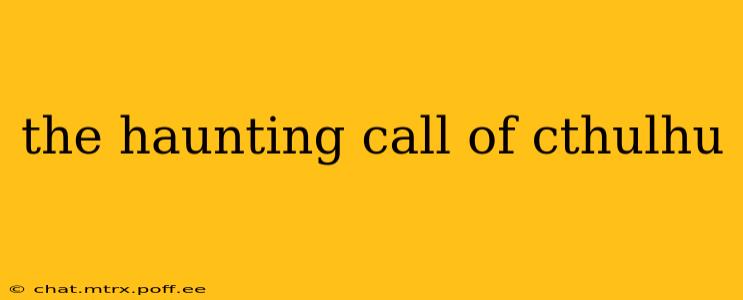H.P. Lovecraft's "The Call of Cthulhu" isn't just a story; it's a foundational text in the genre of cosmic horror. Published in 1928, it introduced readers to a terrifying, indifferent universe where humanity occupies a minuscule, insignificant corner, perpetually threatened by ancient, powerful entities beyond comprehension. This essay will explore the story's enduring power, analyzing its themes, symbolism, and lasting influence on literature and popular culture.
What is the Call of Cthulhu About?
At its heart, "The Call of Cthulhu" is a detective story. It follows the investigation of young artist Francis Wayland Thurston into the bizarre death of his great-uncle, George Gammell Angell. Angell's unsettling dreams and frantic scribblings lead Thurston down a rabbit hole of occult investigations, uncovering a cult worshipping a monstrous entity known as Cthulhu. This being, imprisoned in the sunken city of R'lyeh, exerts a subtle, unsettling influence on the world, threatening humanity with its eventual awakening. The story unfolds through a series of interconnected accounts, building suspense and dread as the horrifying truth is slowly revealed. The narrative expertly blends the seemingly mundane with the utterly terrifying, blurring the line between sanity and madness.
What is Cthulhu?
Cthulhu is not merely a monster; it's a cosmic entity of unimaginable power and scale. Lovecraft describes it as a creature of immense size, with a grotesque, cephalopod-like body and bat-like wings. Its very form defies human understanding, evoking a feeling of primordial horror. The key to Cthulhu's terrifying nature isn't just its physical appearance but its utter indifference to humanity. It's not malevolent in a traditional sense; it simply exists, a force of nature that could crush humanity without a second thought. This cosmic indifference is arguably the most unsettling aspect of the story.
Who Wrote the Call of Cthulhu?
"The Call of Cthulhu" was written by Howard Phillips Lovecraft, a prolific American author of horror, fantasy, and science fiction. Lovecraft is considered a master of cosmic horror, a subgenre he largely defined. His work is characterized by its bleak pessimism, exploration of the unknown, and the insignificance of humanity in the face of cosmic indifference. Lovecraft's writings heavily influenced subsequent generations of horror writers and continue to inspire works in various media, from video games to film.
What are the Main Themes in the Call of Cthulhu?
Several significant themes run throughout "The Call of Cthulhu":
- The insignificance of humanity: Lovecraft emphasizes the utter insignificance of humankind in the vast, indifferent universe. Our achievements, our struggles, our very existence pale in comparison to the cosmic entities that dwell beyond our understanding.
- The horror of the unknown: The story effectively taps into the human fear of the unknown, of things beyond our comprehension. Cthulhu's very existence is a threat, not because of active malice, but simply because of its incomprehensible nature.
- The fragility of sanity: The story explores the fragility of the human mind in the face of overwhelming horror. Characters experience unsettling dreams, visions, and a creeping sense of madness as they delve deeper into the mystery.
- The persistence of ancient evils: The story suggests that ancient, powerful entities capable of unspeakable horrors lie dormant, waiting for the opportune moment to wreak havoc.
What is the Symbolism in the Call of Cthulhu?
The story is rich in symbolism:
- R'lyeh: The sunken city serves as a symbol of the unknown and the hidden power that lurks beneath the surface of reality.
- Cthulhu's form: Its grotesque appearance represents the chaotic, unknowable nature of the universe.
- The cult: The worshipers of Cthulhu symbolize the blind faith and desperate hope in the face of overwhelming power.
What is the Legacy of the Call of Cthulhu?
"The Call of Cthulhu" has had a profound and lasting impact on literature and popular culture. It's considered a seminal work of cosmic horror, inspiring countless imitations and homages. The term "Cthulhu Mythos" itself has become a recognized element of modern horror fiction, encompassing Lovecraft's work and the many stories and adaptations that followed. The enduring appeal of "The Call of Cthulhu" lies in its ability to tap into primal fears, reminding us of our vulnerability in a vast and potentially hostile universe. Its influence can be seen across various media, including video games, films, and even music, cementing its place as a cornerstone of the horror genre.
This exploration only scratches the surface of the complexities within "The Call of Cthulhu." Its haunting imagery and unsettling themes continue to resonate with readers and viewers, making it a timeless masterpiece of cosmic horror.
